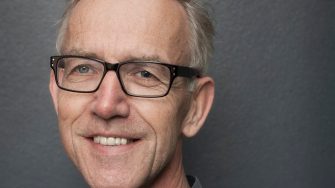Meet our WRC Researcher
Scientia Professor David Waite
For Domestic Students only
Scientia Professor David Waite
For Domestic Students only

A biogeochemical engineer and environmental technologist, Professor Waite is head of the Waite Research Group in the Water Research Centre. He’s also the Executive Director and CEO of the UNSW Centre for Transformational Environmental Technologies (CTET), a Yixing-based R&D centre established five years ago.
When he’s not studying the secrets of aquatic systems in Sydney, Scientia Professor David Waite is ushering in the next generation of environmental technologies in Yixing, China.
A biogeochemical engineer and environmental technologist, Professor Waite is head of the Waite Research Group in the Water Research Centre. He’s also the Executive Director and CEO of the UNSW Centre for Transformational Environmental Technologies (CTET), a Yixing-based R&D centre established five years ago.
He has led decades of research into the study of aquatic systems and the development of novel technologies to solve the pressing challenges these systems face. Collectively, his work spans the entirety of the translational pipeline, from basic science all the way through to commercial application.
“We’re very much driven by the need of the public or industry to solve problems,” he says.
Those problems are incredibly diverse in scope — how can contaminated water in remote locations be transformed into drinking water using novel treatment technologies? Which physical and chemical characteristics of coal dust increase the risk of lung disease for coal workers? Why aren’t algae in the ocean growing fast enough to provide a global carbon balance?
This last question has been central to Professor Waite’s work since the 1980s when he and his team discovered that low iron uptake was limiting the growth of marine algae.
Back then, nobody knew that algae were one of the world’s most critical carbon sinks, responsible for absorbing an estimated 50 per cent of global CO2 and turning it into biomass.
Today, however, the vital importance of Professor Waite’s research in this domain is more apparent than ever.
“We’ve undertaken a lot of work on the role of iron as a micronutrient and its impact on algae and have spent many years studying the processes that control the availability of iron to these important organisms, especially when the algae have sufficient major nutrients such as nitrogen and phosphorus and light,” he says.
“Making iron more available to these organisms promotes their growth. This is critical in terms of the global carbon cycle as this increased algal growth can counterbalance the increase in atmospheric CO2 content resulting from human activities.”
But Professor Waite’s interests don’t start and end with new discoveries. At CTET, he’s leading a vast program of work to develop novel air, soil and water technologies, including advanced water and wastewater treatments, that may contribute to solving critical environmental challenges once and for all.
CTET is co-funded by UNSW Sydney and the Yixing Industrial Park for Environmental Science and Technology, a branch of China’s highly successful Torch Innovation Precinct initiative.
“The purpose of CTET is to really help translate ideas from low technology readiness levels through to impactful commercial products. We’ve undertaken research on a range of technologies focused on desalination of brackish groundwaters so that these waters are suitable for human consumption,” he says.
“A number of our UNSW PhD students have been involved in basic research on these technologies, while our team at CTET is focused more on translating these technologies — and the innovations developed at UNSW — through to application in the real world.”
Current CTET projects include the development of novel advanced oxidation technologies and a novel membrane capacity deionisation (MCDI) system, both of which can remove different contaminants from existing water sources, thereby producing drinkable water in a world where fresh water supplies are dwindling.
The MCDI system is now being trialled at various locations around the world, including in central Australia, and is set to become the focus of a new UNSW spin-off company.
It’s another remarkable achievement in Professor Waite’s career, which now spans more than 40 years, many millions of dollars in research funding, and a long list of professional honours, including his 2018 election to membership of the United States National Academy of Engineering.
But if you ask what him what he sees as his greatest success so far, the answer might surprise you.
“I’m excited by both improving our understanding of our natural environment and in developing pragmatic solutions to solving some of the global challenges we are confronted with,” he says.
“Working with partners, clients, and industry to actually solve real-world problems and to find solutions that are cost effective and sustainable is really satisfying.
“It’s also very rewarding to bring teams of people together and to see those teams make real progress that will improve the world in which we live.”